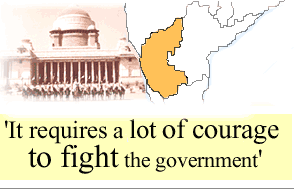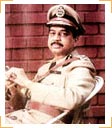|
|
|
|
|
| HOME | NEWS | INTERVIEW | |||
|
February 12, 2001
NEWSLINKS
|
The Rediff Interview/Karnataka Director General of Police C Dinakar  He admits openly to coveting the post of director of the Central Bureau of Investigation, and alleges that R K Raghavan was unfit to occupy the post because he had received political favours. C Dinakar, director general of police of Karnataka, is due to retire from police service at the end of this month. A qualified lawyer, he considers this latest court battle, which he argued and won himself, a good preparation for his career as a lawyer post-retirement. M D Riti found Dinakar -- who wrested the post of DGP last year from his predecessor, T Srinivasulu after a protracted legal battle -- in a relaxed mood at his office on Nrupathunga Road, soon after his successful opposition of Raghavan. Would you like to become CBI director, if they offer you the post now? The very fact that I have fought shows that naturally I would. If you go to the starting block of the 100 metres race and start running, it means you want to finish first in the race. And after you come first, will anyone ask you if you want to take the prize? What provoked you to file this case against Raghavan's appointment? I am not a lucky person like you. I have struggled in my life and come up, right from the age of two-and-a-half years. You are a very lucky person. If I had not struggled and fought, I would not be sitting here today. I would have landed up as a clerk somewhere. I lost my father when I was two-and-half-years old. I did not have a mother until I was 16, 17 years old. I grew up without parents. So I had to fight for every inch. Fighting comes naturally to me, as easily as swimming to a fish. And I always fought for what I thought I deserved, and I always got it. What were the strong points in your case? I had solid proof to show that Raghavan was associated with political leaders, especially a particular leader who was chief minister of Tamil Nadu for five years. The Supreme Court has defined integrity, in the Vineet Narayan case (as differentiated from honesty) saying that a person holding a high office should not be obliged to anyone, and if he is, that shows a lack of integrity. Raghavan has been repeatedly obliged to, and received favours from, this particular leader. My argument is that human relationships are a two-way affair. One person does not confer favours and the other receive it without doing anything in return. I had also alleged that this particular leader, whose party was in coalition with the central government at that point, had exerted pressure to see that Raghavan was made CBI director. None of these allegations were rebutted. In law, if allegations are made on oath by an application, and if those allegations stand unrebutted, they are held as proof. The Supreme Court has specifically said in the Vineet Narayan case that the issue of the appointment of the CBI director comes under the domain of executive prerogative. All along the SC has avoided interfering in this executive prerogative. Here, it said that because of the special circumstances, that require that the CBI organisation should be kept away from the interference of political persons, it felt it necessary to make a dent in executive prerogative and issue directions about the guidelines for the appointment of the CBI director. Four criteria have been laid down: integrity, seniority, experience in investigation and experience in anti-corruption work. I have made several allegations of R K Raghavan having received favours and being obliged to that Tamil Nadu political leader. This has made him lack integrity. The CBI is an organisation that investigates cases involving integrity, so you cannot have a man who lacks integrity heading it. Besides, I have been given the President's gold medal for distinguished service, which comes after completing 25 years of service. Raghavan has been recommended for it 4, 5 times, but was never given it. What next? This is a question you should ask the bigwigs sitting in Delhi. What can I answer? The ball is in their court. They have been directed to take further action. Let them take it. Over the years and your various battles with the system you work for, you have become a symbol for courage and perseverance to fight for what you believe to be your rights. I am sure this is a morale booster for your colleagues in service, who might have had similar grievances, but lacked the push to fight for them in courts and tribunals. It requires a lot of courage to fight against the government. It is all powerful. It looks with a magnifying glass to try and find anything that it can use against you. When I fought the state government for three-and-a-half years, I really felt the pinch. How many cases have you fought so far? How many have you won? I have fought 14 cases. I lost only one at the Central Administrative Tribunal, and then won it in the high court. Although I had an outstanding record, I was not given the first police medal for service which you get after 15 years or service. I was recommended for it 13 times, but the state government did not give it. I appealed for it to the CAT and finally won it. I fought for this medal from 1990 to 1994, and then got it in 1994. That was one of my cases. There were many others. I fought and got the President's gold medal two-and-a-half years later. I also fought and won two cases for the state government in the Supreme Court. One was a false caste certificate case. When this case came for admission to the Supreme Court, all the government advocates were no doubt there. They are all very meritorious persons. They can stand, their legs are very strong. But their tongues are not very strong. So I took the permission of the court and argued that case. And won it. The other was the PC Dental College case against S Bangarappa. The government advocate stood at that time, before Justice Kuldip Singh, in the Supreme Court. I was also there. Singh asked, who is this man? I said I was the additional DG, COD. So Singh said, if you know the facts, you please narrate them. I did. Thereafter, he ordered that a case should be registered for corruption against Bangarappa. Have you argued most of your cases yourself? Only those two for the government, and six of my own cases. I had engaged lawyers for the others. The case which I lost before the CAT was given to an advocate, and he lost it. Any lawyer will tell you that a person should never argue his own case in court, because he becomes emotional. Also, since you know all the facts of the case, you tend to put them all before the court, including many that are disadvantageous to you also. There is a technique to this: you should know which are the facts that are relevant, that do not work to your disadvantage.
If you want to take on the government, as you have repeatedly, I suppose you must have a scrupulously clean record, everything in your past comes under a magnifying glass. Do you think this is why many of your brethren in service do not try to go against the government: are many of them simply not clean enough to do so? You have to pay a very high price for doing this. When I filed my case opposing the appointment of Srinivasulu as DG of police, J H Patel was chief minister. I do not know who ordered it, but someone decided that my house should be watched. One head constable and four constables were posted in front of my house. I spotted them and asked them, why have you come here? "Illa saar, watch maadabeku antha heliddare (They have ordered us to watch your house)," the head constable replied. I said, please go ahead. You know what they saw and recorded? Orderlies coming at 8 am, maidservant at 9 am, dhobi at 11 am. They wrote all this and sent it up. He (Patel) probably thought I would be interacting with a large number of political leaders and getting their support. Now that you are retiring at the end of this month, will you be pursuing a career as a lawyer? I will be applying for registration as an advocate on March 1, and as soon as I am enrolled, I will be filing cases. I will file quite a few public interest litigations to start with, and continue that in addition to the cases in which I will be appearing for others. Were you harrassed in any way, subtly or openly, by the government, when you fought this case against the CBI director? No, because they had taken it for granted that I would lose the case. What happened two days ago is now a good indicator of my competence, right? Did you win because the government was too complacent?
Why did you not accept Gowda's offer, if you wanted that post? I had accepted, but he had said that he would go to Russia and come back to pass the order. But by the time he came back from Russia, the Congress president had withdrawn his support to him. Looking back, however, I feel everything happens for the best. Many people point out that if I had become DG of police in 1997, when Srinivasulu got that post, I would have been DG for three years. But like many others, I would have been a DGP and just walked out of the office, that's all. Now I think I have achieved something that I would not have achieved if I had continued for three years. Besides, if I had waited to retire to start practising, it would have taken me three or four years to get into the swing of good advocacy. Now I have learnt all this very well over the past few years. The government has given me the opportunity to learn court procedures and rules at the government's expense. Instead of learning all these things at my client's cost after retirement, I am coming out of government service and into the courtroom fully equipped, technically and mentally. Have you been able to do effective and good policing, what with all this time you have been spending in the courts?
You are to retire at the end of this month. Raghavan retires in April. If the government wants to appoint you as the next CBI director, how will it work out? The officer appointed as director of CBI must have a minimum tenure of two years. If am appointed now, I will have a tenure of two years. The law says either this minimum tenure, or if a director reaches the age of 60 years, whichever happens later. Raghavan has already completed two years and is also about to turn 60. Probably you did not feel his presence there for the past two years (laughs uproariously). Design: Lynette Menezes
|
||
|
HOME |
NEWS |
CRICKET |
MONEY |
SPORTS |
MOVIES |
CHAT |
BROADBAND |
TRAVEL ASTROLOGY | NEWSLINKS | BOOK SHOP | MUSIC SHOP | GIFT SHOP | HOTEL BOOKINGS AIR/RAIL | WEDDING | ROMANCE | WEATHER | WOMEN | E-CARDS | SEARCH HOMEPAGES | FREE MESSENGER | FREE EMAIL | CONTESTS | FEEDBACK |
|||